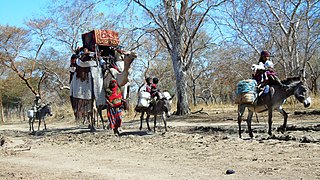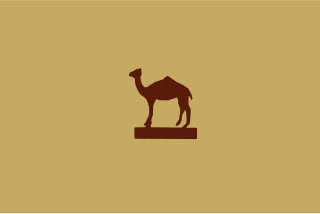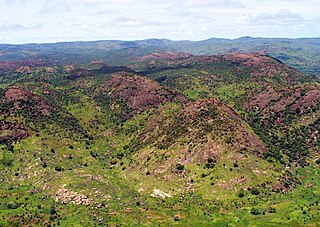Related Research Articles

The Kordofanian languages are a geographic grouping of five language groups spoken in the Nuba Mountains of the South Kordofan region of Sudan: Talodi–Heiban languages, Lafofa languages, Rashad languages, Katla languages and Kadu languages. The first four groups are sometimes regarded as branches of the hypothetical Niger–Congo family, whereas Kadu is now widely seen as a branch of the proposed Nilo-Saharan family.
The Nubian languages are a group of related languages spoken by the Nubians. In the past, Nubian languages were spoken throughout much of Sudan, but as a result of Arabization they are today mostly limited to the Nile Valley between Aswan and Al Dabbah. In the 1956 Census of Sudan there were 167,831 speakers of Nubian languages. Nubian is not to be confused with the various Nuba languages spoken in villages in the Nuba mountains and Darfur.
Nubians are a Nilo-Saharan ethnic group indigenous to the region which is now Northern Sudan and Southern Egypt. They originate from the early inhabitants of the central Nile valley, believed to be one of the earliest cradles of civilization. In the southern valley of Egypt, Nubians differ culturally and ethnically from Egyptians, although they intermarried with members of other ethnic groups, especially Arabs. They speak Nubian languages as a mother tongue, part of the Northern Eastern Sudanic languages, and Arabic as a second language.

The Baggāra or Chadian Arabs are a nomadic confederation of people of mixed Arab and Arabized indigenous African ancestry, inhabiting a portion of the Sahel mainly between Lake Chad and the Nile river near south Kordofan, numbering over six million. They are known as Baggara and Abbala in Sudan, and as Shuwa Arabs in Cameroon, Nigeria and Western Chad. The term Shuwa is said to be of Kanuri origin.

Kordofan is a former province of central Sudan. In 1994 it was divided into three new federal states: North Kordofan, South Kordofan and West Kordofan. In August 2005, West Kordofan State was abolished and its territory divided between North and South Kordofan States, as part of the implementation of the Comprehensive Peace Agreement between the Government of Sudan and the Sudan People's Liberation Movement. West Kordofan was reestablished in July 2013.

The Nuba Mountains, also referred to as the Nuba Hills, is an area located in South Kordofan, Sudan. The area is home to a group of indigenous ethnic groups known collectively as the Nuba peoples. In the Middle Ages, the Nuba mountains had been part of the Nubian kingdom of Alodia. In the 18th century, they became home to the kingdom of Taqali that controlled the hills of the mountains until their defeat by Mahdi Muhammad Ahmad. After the British defeated the Mahdi army, Taqali was restored as a client state. Infiltration of the Messiria tribe of Baggara Arabs has been influential in modern conflicts. Up to 1.5 million people live in the mountains, mostly ethnic Nuba, with a small minority of Baggara.
The Nuba people are indigenous inhabitants of central Sudan. The Nuba are made up of 50 various indigenous ethnic groups who inhabit the Nuba Mountains of South Kordofan state in Sudan, encompassing multiple distinct people that speak different languages which belong to at least two unrelated language families. Since 2011, when the southern part of Sudan became an independent state as South Sudan, the Nuba now live in the southern part of Sudan. Estimates of the Nuba population vary widely; the Sudanese government estimated that they numbered 2.07 million in 2003.
Nobiin, also known as Halfawi, Mahas, is a Northern Nubian language of the Nilo-Saharan language family. "Nobiin" is the genitive form of Nòòbíí ("Nubian") and literally means "(language) of the Nubians". Another term used is Noban tamen, meaning "the Nubian language".
The Kadaru are a sub-ethnic group of the Nuba peoples in the Nuba Mountains of South Kordofan state, in southern Sudan. They live in the Kadaru Hills between Dilling and Delami in South Kurdufan.
The Karko are a sub-ethnic group of the Nuba peoples in the Nuba Mountains of South Kordofan state, in southern Sudan.
The Daju people are a group of seven distinct ethnicities speaking related languages living on both sides of the Chad-Sudan border and in the Nuba Mountains. Separated by distance and speaking different languages, at present, they generally have little cultural affinity to each other.
The Keiga people are a sub-ethnic group of the Nuba peoples in the Nuba Mountains of South Kordofan state, in southern Sudan. The population of this ethnicity likely is below 10,000. They speak Keiga, a Nilo-Saharan language. The language belongs to the Kadugli–Krongo family.
Krongo, also spelled Korongo or Kurungu and known as Dimodongo, Kadumodi, or Tabanya after local towns, is a Kadu language spoken in the South West of the Nuba Mountains in South Kordofan, Sudan.

Tegali is a Kordofanian language in the Rashad family, which is thought by some to belong to the hypothetical Niger–Congo phylum. It is spoken in South Kordofan state, Sudan.
Afitti is a language spoken on the eastern side of Jebel el-Dair, a solitary rock formation in the North Kordofan province of Sudan. Although the term ‘Dinik’ can be used to designate the language regardless of cultural affiliation, people in the villages of the region readily recognize the terms ‘Ditti’ and ‘Afitti.’ There are approximately 4,000 speakers of the Afitti language and its closest linguistic neighbor is the Nyimang language, spoken west of Jebel el-Dair in the Nuba Mountains of the South Kordofan province of Sudan.
The Hill Nubian languages, also called Kordofan Nubian, are a dialect continuum of Nubian languages spoken by the Hill Nubians in the northern Nuba Mountains of Sudan.
Karko is a Hill Nubian language spoken in the northwestern Nuba Mountains in the south of Sudan. It is spoken by around 7,000 people in the Karko hills, 35 km west of Dilling, including Dulman, although Jakobi Angelika & Hamdan Ahma estimate the Karko population at up to 15,000 individuals, mostly in urban centers. Ethnologue reports that speakers of Karko are shifting to Sudanese Arabic.
Kadaru is a Hill Nubian language spoken in the northern Nuba Mountains in the south of Sudan. It is spoken by around 25,000 people in the Jibaal as-Sitta hills, between Dilling and Delami. Kordofan Nubian is a cluster of dialects also called Ajang Language with names of dialects varying according to specific clans. According to Ajang people, they all belong to one language group and although some sounds and words might have changed with time, they can understand each other quite well. It is closely related to Ghulfan, with which it forms the Kadaru-Ghulfan subgroup of Hill Nubian.
Logorik, Subori, or Saburi is a (critically) endangered language spoken in Eastern Sudan and Western Chad.

The Nuba Mountains, located in the West Kordofan and South Kordofan states in the south of Sudan, are inhabited by a diverse set of populations speaking various languages not closely related to one another.
References
- ↑ Rilly, Claude; Voogt, Alex de (2012-08-27). The Meroitic Language and Writing System. Cambridge University Press. p. 73. ISBN 9781139560535.
- ↑ Sesana, Renato Kizito; Borruso, Silvano (2006). I Am a Nuba. Paulines Publications Africa. p. 26. ISBN 9789966081797.
- ↑ Ehret, Christopher; Posnansky, Merrick (1982). The Archaeological and Linguistic Reconstruction of African History. University of California Press. p. 47. ISBN 9780520045934.